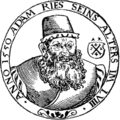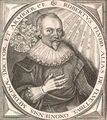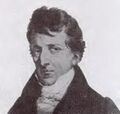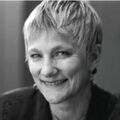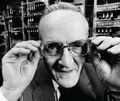Template:Selected anniversaries/January 17: Difference between revisions
No edit summary |
No edit summary |
||
| (46 intermediate revisions by the same user not shown) | |||
| Line 1: | Line 1: | ||
<gallery> | <gallery> | ||
|| *** DONE: Pics *** | |||
||1429/1433: Antonio del Pollaiuolo born ... painter, sculptor, engraver and goldsmith during the Italian Renaissance. Pic (bust in niche). (Fiction: scrying engine.) | |||
File:Adam Ries.png|link=Adam Ries (nonfiction)|1492: Mathematician [[Adam Ries (nonfiction)|Adam Ries]] born (uncertain). He will write textbooks for practical mathematics, promoting the advantages of Arabic/Indian numerals over Roman numerals. | File:Adam Ries.png|link=Adam Ries (nonfiction)|1492: Mathematician [[Adam Ries (nonfiction)|Adam Ries]] born (uncertain). He will write textbooks for practical mathematics, promoting the advantages of Arabic/Indian numerals over Roman numerals. | ||
||1501 | ||1501: Leonhart Fuchs born ... physician and botanist. Pic. | ||
||1524 | ||1524: Giovanni da Verrazzano sets sail westward from Madeira to find a sea route to the Pacific Ocean. Pic. | ||
File:Pedro Mejía.jpg|link=Pedro Mexía (nonfiction)|1551: Writer, humanist, and historian [[Pedro Mexía (nonfiction)|Pedro Mexía]] dies. He wrote ''Silva de varia lección'' ("A Miscellany of Several Lessons"), which became an early best seller across Europe. | File:Pedro Mejía.jpg|link=Pedro Mexía (nonfiction)|1551: Writer, humanist, and historian [[Pedro Mexía (nonfiction)|Pedro Mexía]] dies. He wrote ''Silva de varia lección'' ("A Miscellany of Several Lessons"), which became an early best seller across Europe. | ||
File: | ||1560: Gaspard Bauhin born ... botanist, physician, and academic. Pic. | ||
File:Robert Fludd.jpg|link=Robert Fludd (nonfiction)|1574: Astrologer, mathematician, cosmologist, Qabalist and Rosicrucian apologist [[Robert Fludd (nonfiction)|Robert Fludd]] born. | |||
||1618: Luca Valerio dies mathematician who applied methods of Archimedes to find volumes and centers of gravity of solid bodies. He corresponded with Galileo. *SAU No DOB. Pic: book cover. | |||
||1624: Camillo-Guarino Guarini born ... architect of the Piedmontese Baroque, active in Turin as well as Sicily, France, and Portugal. He was a Theatine priest, mathematician, and writer. Pic. | |||
File:Elisabeth_Hevelius_(1673).png|link=Elisabeth Hevelius (nonfiction)|1647: Astronomer [[Elisabeth Hevelius (nonfiction)|Elisabeth Hevelius]] born. One of the first female astronomers, Hevelius will be called "the mother of moon charts". | |||
||1666: Antonio Maria Valsalva born ... anatomist and physician. His research focused on the anatomy of the ears: he coined the term Eustachian tube, and he described the aortic sinuses of Valsalva in his writings. His name is associated with the Valsalva antrum of the ear and the Valsalva maneuver, which is used as a test of circulatory function. Pic. | |||
||1670 Jean Leurechon born ... priest and mathematician. His most famous work is the Récréations Mathématiques written under the pseudonym Hendrik van Etten. The book is a collection of recreational mathematical puzzles. The book made him famous all over Europe. No DOB. Pic: book cover. | |||
||1675: Bernard Frénicle de Bessy dies ... wrote numerous mathematical papers, mainly in number theory and combinatorics. He is best remembered for Des quarrez ou tables magiques, a treatise on magic squares published posthumously in 1693, in which he described all 880 essentially different normal magic squares of order 4. The Frénicle standard form, a standard representation of magic squares, is named after him. No DOB. Pic: book cover. | |||
||1685: The very first documented coffee house in Vienna opens ... Johannes Deodat (or Diodato, known in Armenian as Owanes Astouatzatur - Յովհաննէս Աստուածատուր - some sources claiming him to be Greek). https://en.wikipedia.org/wiki/Armenians_in_Austria No pic online. | |||
||1698: Moyse Charas born ... apothecary in France during the reign of Louis XIV. He became famous for publishing compendiums of medication formulas, which played vital roles in the development of modern pharmacy and chemistry. Pic. | |||
||1705: John Ray born ... biologist and botanist. He published important works on botany, zoology, and natural theology. His classification of plants in his Historia Plantarum, was an important step towards modern taxonomy. Ray rejected the system of dichotomous division by which species were classified according to a pre-conceived, either/or type system, and instead classified plants according to similarities and differences that emerged from observation. He was among the first to attempt a biological definition for the concept of species. Pic. | |||
|| | File:Benjamin Franklin Drawing Electricity from the Sky (circa 1816) by Benjamin West.jpg|link=Benjamin Franklin (nonfiction)|1706: Inventor, publisher, and statesman [[Benjamin Franklin (nonfiction)|Benjamin Franklin]] born. | ||
||1757: John Gough born ... natural and experimental philosopher who is known for his own investigations as well as the influence he had on both John Dalton and William Whewell. Pic search. | |||
|| | ||1761: James Hall born ... geologist and geophysicist. Pic search. | ||
|| | ||1775: Vincenzo Riccati dies ... mathematician and physicist. He was the brother of Giordano Riccati, and the second son of Jacopo Riccati. Riccati's main research continued the work of his father in mathematical analysis, especially in the fields of the differential equations and physics. Pic. | ||
|| | ||1781: Robert Hare born ... chemist. Pic. | ||
||1786: Comet Encke or Encke's Comet (official designation: 2P/Encke) is a periodic comet that completes an orbit of the Sun once every 3.3 years. (This is the shortest period of a reasonably bright comet; the faint main-belt comet 311P/PANSTARRS has a period of 3.2 years.) Encke was first recorded by Pierre Méchain in 1786, but it was not recognized as a periodic comet until 1819 when its orbit was computed by Johann Franz Encke | ||1786: Comet Encke or Encke's Comet (official designation: 2P/Encke) is a periodic comet that completes an orbit of the Sun once every 3.3 years. (This is the shortest period of a reasonably bright comet; the faint main-belt comet 311P/PANSTARRS has a period of 3.2 years.) Encke was first recorded by Pierre Méchain in 1786, but it was not recognized as a periodic comet until 1819 when its orbit was computed by Johann Franz Encke | ||
File: | ||1833: Friedrich Koenig dies ... inventor best known for his high-speed steam-powered printing press, which he built together with watchmaker Andreas Friedrich Bauer. This new style of printing press could print up to 1,100 sheets per hour, printing on both sides of the paper at the same time. Pic. | ||
File:Giovanni Aldini.jpg|link=Giovanni Aldini (nonfiction)|1834: Physicist and academic [[Giovanni Aldini (nonfiction)|Giovanni Aldini]] dies. Aldini contributed to galvanism, anatomy and its medical applications, the construction and illumination of lighthouses, and the mitigation of the destructive effects of fire. | |||
||1834: August Weismann born ... biologist, zoologist, and geneticist. Pic. | |||
|| | ||1857: Eugène Augustin Lauste born ... inventor instrumental in the technological development of the history of cinema. Pic search. | ||
|| | ||1868: Louis Couturat born ... logician, mathematician, philosopher, and linguist. Pic. | ||
|| | ||1881: Antoni Łomnicki born ... mathematician and academic. Pic. | ||
|| | ||1886: Glenn L. Martin born ... pilot and businessman, founded the Glenn L. Martin Company. Pic. | ||
||1897 | ||1897: Marcel Petiot born ... physician and serial killer. Pic. | ||
|| | ||1889: Ralph Howard Fowler born ... physicist and astronomer. Pic. | ||
||1899 | ||1899: Al Capone born ... mob boss. Pic. | ||
||1899 | ||1899: Nevil Shute born ... engineer and author. Pic. | ||
File:Electrocuting_an_Elephant.png|link=Electrocuting an Elephant (nonfiction)|1903: The short film ''[[Electrocuting an Elephant (nonfiction)|Electrocuting an Elephant]]'' is released. It documents the | File:Electrocuting_an_Elephant.png|link=Electrocuting an Elephant (nonfiction)|1903: The short film ''[[Electrocuting an Elephant (nonfiction)|Electrocuting an Elephant]]'' is released. It documents the deliberate execution of an elephant named Topsy. | ||
||Friedrich Wilhelm Georg Kohlrausch | ||1905: Dattathreya Ramchandra Kaprekar born ... recreational mathematician who described several classes of natural numbers including the Kaprekar, Harshad and Self numbers and discovered the Kaprekar constant, named after him. Pic. Death date unknown. | ||
||1910: Friedrich Wilhelm Georg Kohlrausch dies ... physicist who investigated the conductive properties of electrolytes and contributed to knowledge of their behavior. He also investigated elasticity, thermoelasticity, and thermal conduction as well as magnetic and electrical precision measurements. Pic. | |||
File:Francis Galton 1850s.jpg|link=Francis Galton (nonfiction)|1911: Statistician, progressive, polymath, sociologist, psychologist, anthropologist, eugenicist, tropical explorer, geographer, inventor, meteorologist, proto-geneticist, and psychometrician [[Francis Galton (nonfiction)|Francis Galton]] dies. | File:Francis Galton 1850s.jpg|link=Francis Galton (nonfiction)|1911: Statistician, progressive, polymath, sociologist, psychologist, anthropologist, eugenicist, tropical explorer, geographer, inventor, meteorologist, proto-geneticist, and psychometrician [[Francis Galton (nonfiction)|Francis Galton]] dies. | ||
||Shaun Wylie | ||1913: Shaun Wylie born ... mathematician and World War II codebreaker. Pic. | ||
|| | ||1917: Daniel Shanks born ... mathematician who worked primarily in numerical analysis and number theory. He is best known as the first to compute π to 100,000 decimal places, and for his book Solved and Unsolved Problems in Number Theory. Pic. | ||
|| | ||1919: Mingote dies ... cartoonist and journalist. Pic. | ||
||1921: Antonio Prohías born ... cartoonist. Pic search. | |||
|| | ||1923: Corrado Böhm born ... computer scientist and academic known especially for his contributions to the theory of structured programming, constructive mathematics, combinatory logic, lambda calculus, and the semantics and implementation of functional programming languages. Pic search. | ||
||1945 | ||1924: Jewel Plummer Cobb born ... biologist, cancer researcher, and academic. Pic. | ||
||1929: William Leonard Hunt (The Great Farini) dies ... well-known nineteenth- and early twentieth-century Canadian funambulist, entertainment promoter and inventor. Pic. | |||
||1929: Popeye the Sailor Man, a cartoon character created by E. C. Segar, first appears in the Thimble Theatre comic strip. | |||
||1941: Eduard Zintl dies ... chemist. He gained prominence for research on intermetallic compounds. Pic search. | |||
||1945: Swedish diplomat Raoul Wallenberg is taken into Soviet custody while in Hungary; he is never publicly seen again. Pic. | |||
||1948: Ludwik Silberstein dies ... physicist who helped make special relativity and general relativity staples of university coursework. His textbook The Theory of Relativity was published by Macmillan in 1914 with a second edition, expanded to include general relativity, in 1924. Pic search. | |||
File:Anita Borg.jpg|link=Anita Borg (nonfiction)|1949: Computer scientist [[Anita Borg (nonfiction)|Anita Borg]] born. She will found the Anita Borg Institute for Women and Technology. | File:Anita Borg.jpg|link=Anita Borg (nonfiction)|1949: Computer scientist [[Anita Borg (nonfiction)|Anita Borg]] born. She will found the Anita Borg Institute for Women and Technology. | ||
||1949: For the first time, full energy was released by the first synchrotron which was installed at the Radiation Laboratory, University of California, Berkeley. It was invented by Edwin Mattison of the same university, and would accelerate electrons by virtue of their negative charges, using a betatron-type magnet that weighed about 8 tons. The synchrotron was constructed at the General Electric Research Laboratory at Schnectady, N.Y. by Dr. Herbert C. Pollock and Willem F. Westendorp. *TIS | |||
||1954: Leonard Eugene Dickson dies ... was an American mathematician. He was one of the first American researchers in abstract algebra, in particular the theory of finite fields and classical groups, and is also remembered for a three-volume history of number theory, History of the Theory of Numbers. Pic not Wikipedia. | |||
File:Eisenhower in the Oval Office February 1956.jpg|link=Military-industrial complex (nonfiction)|1961: U.S. President Dwight D. Eisenhower delivers a televised farewell address to the nation three days before leaving office, in which he warns against the accumulation of power by the "[[Military-industrial complex (nonfiction)|military–industrial complex]]." | File:Eisenhower in the Oval Office February 1956.jpg|link=Military-industrial complex (nonfiction)|1961: U.S. President Dwight D. Eisenhower delivers a televised farewell address to the nation three days before leaving office, in which he warns against the accumulation of power by the "[[Military-industrial complex (nonfiction)|military–industrial complex]]." | ||
| Line 66: | Line 108: | ||
File:Palomares H-Bomb Incident.jpg|link=1966 Palomares B-52 crash (nonfiction)|1966: [[1966 Palomares B-52 crash (nonfiction)|Palomares incident]]: A B-52 bomber collides with a KC-135 Stratotanker over Spain, killing seven airmen, and dropping three 70-kiloton nuclear bombs near the town of Palomares and another one into the sea. | File:Palomares H-Bomb Incident.jpg|link=1966 Palomares B-52 crash (nonfiction)|1966: [[1966 Palomares B-52 crash (nonfiction)|Palomares incident]]: A B-52 bomber collides with a KC-135 Stratotanker over Spain, killing seven airmen, and dropping three 70-kiloton nuclear bombs near the town of Palomares and another one into the sea. | ||
||1975: Georgi Evgen'evich Shilov dies ... mathematician and expert in the field of functional analysis, who contributed to the theory of normed rings and generalized functions. Pic. | |||
||1985: The last day for the card catalog at the New York Public Library. It contained 10 million dog-eared cards in 9,000 oak drawers. It was replaced by 800 bound volumes of photocopies of the cards and a computer catalog. *AP press release, 18 Jan 1985. | |||
||1994 | ||1994: Yevgeni Ivanov dies ... spy. Pic search. | ||
||1997 | ||1997: Cape Canaveral Air Force Station: A Delta II carrying a GPS2R satellite explodes 13 seconds after launch, dropping 250 tons of burning rocket remains around the launch pad. | ||
File:Clyde W. Tombaugh.jpg|link=Clyde Tombaugh (nonfiction)|1997: Astronomer and academic [[Clyde Tombaugh (nonfiction)|Clyde Tombaugh]] dies. He discovered Pluto, as well as many asteroids. | File:Clyde W. Tombaugh.jpg|link=Clyde Tombaugh (nonfiction)|1997: Astronomer and academic [[Clyde Tombaugh (nonfiction)|Clyde Tombaugh]] dies. He discovered Pluto, as well as many asteroids. | ||
||2002 | ||2000: Eugène Ehrhart dies ... mathematician who introduced Ehrhart polynomials in the 1960s. Pic search. | ||
File:Tom Kilburn.jpg|link=Tom Kilburn (nonfiction)|2001: Mathematician and computer scientist [[Tom Kilburn (nonfiction)|Tom Kilburn]] dies. Over the course of a productive 30-year career, he was involved in the development of five computers of great historical significance. | |||
||2002: Roman Personov dies ... physicist and academic ... one of the founders of selective laser spectroscopy of complex molecules in solids (frozen solutions). Pic search. | |||
||2005 | ||2005: Albert Schatz dies ... microbiologist and academic. Pic. | ||
||2008 | ||2008: Bobby Fischer dies ... chess player and author. Pic. | ||
</gallery> | </gallery> | ||
Latest revision as of 12:27, 17 January 2022
1492: Mathematician Adam Ries born (uncertain). He will write textbooks for practical mathematics, promoting the advantages of Arabic/Indian numerals over Roman numerals.
1551: Writer, humanist, and historian Pedro Mexía dies. He wrote Silva de varia lección ("A Miscellany of Several Lessons"), which became an early best seller across Europe.
1574: Astrologer, mathematician, cosmologist, Qabalist and Rosicrucian apologist Robert Fludd born.
1647: Astronomer Elisabeth Hevelius born. One of the first female astronomers, Hevelius will be called "the mother of moon charts".
1706: Inventor, publisher, and statesman Benjamin Franklin born.
1834: Physicist and academic Giovanni Aldini dies. Aldini contributed to galvanism, anatomy and its medical applications, the construction and illumination of lighthouses, and the mitigation of the destructive effects of fire.
1903: The short film Electrocuting an Elephant is released. It documents the deliberate execution of an elephant named Topsy.
1911: Statistician, progressive, polymath, sociologist, psychologist, anthropologist, eugenicist, tropical explorer, geographer, inventor, meteorologist, proto-geneticist, and psychometrician Francis Galton dies.
1949: Computer scientist Anita Borg born. She will found the Anita Borg Institute for Women and Technology.
1961: U.S. President Dwight D. Eisenhower delivers a televised farewell address to the nation three days before leaving office, in which he warns against the accumulation of power by the "military–industrial complex."
1966: Palomares incident: A B-52 bomber collides with a KC-135 Stratotanker over Spain, killing seven airmen, and dropping three 70-kiloton nuclear bombs near the town of Palomares and another one into the sea.
1997: Astronomer and academic Clyde Tombaugh dies. He discovered Pluto, as well as many asteroids.
2001: Mathematician and computer scientist Tom Kilburn dies. Over the course of a productive 30-year career, he was involved in the development of five computers of great historical significance.
